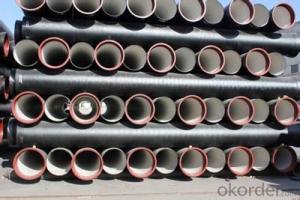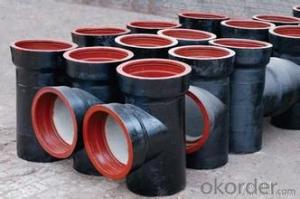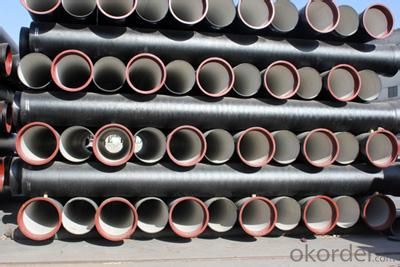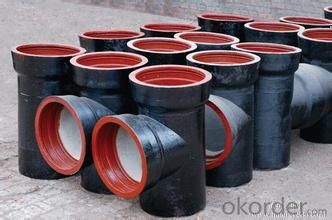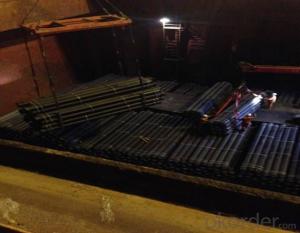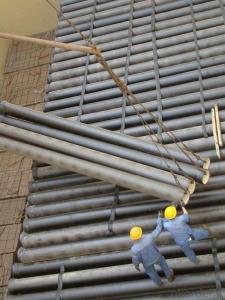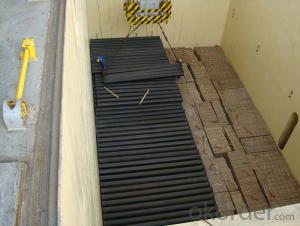DUCTILE IRON PIPE K9 DN700
- Loading Port:
- China Main Port
- Payment Terms:
- TT OR LC
- Min Order Qty:
- -
- Supply Capability:
- -
OKorder Service Pledge
OKorder Financial Service
You Might Also Like
Ductile Iron Cast Pipe is without any defects compare with tradition casting tech, which has many advantages particularly as follow:
(1) High density. In the "vertical upward casting" process, the melt iron of centre liquid column in center crystallizer is continuously feeding for volume shrinkage caused by condensation tube at outer circumference , which lead to be free of shrinkage porosity.
(2) High purity. When melt iron pouring, the mixed impurities such as gas, dross, sand grain which are lighter than melt iron could be eliminated at furnace mouth, its impossible to enter into the crystallizer through the channel, so the melt iron into the crystallizer is very pure.
(3) Strength with toughness. The cooling speed provided by continuous crystallizer is 30 times than sand casting and 5 times than centrifugal casting, and doesn't produce white iron, the eutectic cell volume of continuous cast iron is one eighth to one tenth compare with traditional cast iron. The density of graphite nodule in ductile iron can reach 300-700 pcs/mm2. Therefore, all reason above improve the strength and toughness of continuous cast iron.
(4) Free machining. The high speed cooling make the hardening phase (such as boride, steadite) not appear like reticular, massive or thick, but diffuse like fish bone and pane in shape, moreover, there are tiny graphite flakes inlaid hardening phase. It's free machining in BrinellHardness the range of 250-300HB. However, the Brinell Hardness of 250 is top limit to common metal materials.
(5) Uniform composition of tube wall. The convection mixing of liquid column caused by marching type drawing in crystallizer make the composition of tube wall well-distributed, and concentration gradient very little.
(6) High productivity. To the wall thickness of tube under 10mm, the speed of continuous casting is 1 meter/min, to the wall thickness of tube under 20mm, the speed of continuous casting is 0.5 meter/min, which is high efficiency that centrifugal or other casting tech couldn't reach.
- Q: Can ductile iron be welded? Is weldability comparable to gray iron?
- Suitable for the full range of cold welding welding, welding cast iron base material can almost all, and it is easy to achieve cast iron and carbon steel dissimilar metal welding, such as solving matrix fracture, crack, wear, hole filling defects after welding can be machined, many applications in the engine casing, cylinder head, casting machine, gear base the tooth of iron castings.
- Q: Are ductile iron pipes resistant to soil movement?
- Indeed, soil movement poses no threat to ductile iron pipes. These pipes boast an impressive tensile strength, enabling them to withstand external forces like soil movement. Specifically engineered for flexibility, they possess the ability to absorb and distribute stresses stemming from ground settlement or other soil movements. Moreover, their robust construction allows them to resist the compressive forces exerted by the surrounding soil. Consequently, ductile iron pipes represent a dependable and enduring option for underground pipelines, ensuring long-term stability and safeguarding against soil movement.
- Q: Can ductile iron pipe be used for sewer and wastewater systems?
- Yes, ductile iron pipe can be used for sewer and wastewater systems. Ductile iron is a strong and durable material that can withstand the harsh conditions of sewage and wastewater transport. It has excellent corrosion resistance and can handle high-pressure environments, making it a suitable choice for these applications.
- Q: Does the cast iron pipe for spheroidal graphite need corrosion protection when laying underground?
- Ductile iron pipe is a kind of cast iron pipe.
- Q: Can ductile iron pipes be used for oil and gas pipelines?
- Yes, ductile iron pipes can be used for oil and gas pipelines. Ductile iron is known for its durability, strength, and corrosion resistance, making it suitable for transporting oil and gas. Its high tensile strength and ability to withstand pressure and extreme temperatures make it a reliable choice for these applications.
- Q: Can ductile iron pipes be used for large-scale irrigation systems?
- Yes, ductile iron pipes can be used for large-scale irrigation systems. Ductile iron pipes are known for their strength, durability, and resistance to corrosion, making them suitable for various applications including irrigation. These pipes are able to withstand high pressure and can handle the demands of large-scale irrigation systems. Additionally, ductile iron pipes have a long lifespan, reducing the need for frequent replacements and maintenance. They are also cost-effective compared to other materials used in irrigation systems. Therefore, ductile iron pipes are a suitable choice for large-scale irrigation systems due to their strength, durability, corrosion resistance, and cost-effectiveness.
- Q: Luo what effect of ductile cast iron
- Chromium is an anti graphitization element, which hinders the graphitization process of cast iron, increases the content of cementite (Fe3C) in the internal structure of cast iron, and stabilizes pearlite at the same time. It affects the mechanical and processing properties of nodular cast iron.
- Q: Can ductile iron pipes be used in contaminated soil conditions?
- Yes, ductile iron pipes can be used in contaminated soil conditions. Ductile iron is known for its strength and durability, making it resistant to corrosion and damage from external factors such as soil contaminants. Additionally, ductile iron pipes have been successfully used in a variety of challenging environments, including contaminated soils, where they can provide reliable and long-lasting underground infrastructure for the transportation of water and other fluids.
- Q: Are ductile iron pipes suitable for gravity flow applications?
- Yes, ductile iron pipes are suitable for gravity flow applications. Ductile iron is a strong and durable material that can withstand the weight of the water and solid waste flowing through the pipes without any issues. It has high tensile strength and can resist damage from external forces such as soil movement or heavy traffic loads. Additionally, ductile iron pipes have smooth inner surfaces that promote efficient flow and minimize friction losses. They are also resistant to corrosion and can last for decades without requiring frequent maintenance or replacement. Overall, ductile iron pipes are a reliable choice for gravity flow applications due to their strength, durability, and resistance to various environmental factors.
- Q: Are there any special considerations for installing ductile iron pipe in rocky soils?
- Yes, there are special considerations for installing ductile iron pipe in rocky soils. The presence of rocks can pose challenges during the installation process as they can cause damage to the pipe or impede its proper alignment. Therefore, it is important to carefully assess the soil conditions and rock content at the installation site. Additional measures such as proper bedding and backfilling techniques, using protective coatings or linings, and employing specialized equipment may be necessary to ensure the durability and longevity of the ductile iron pipe in rocky soils.
Send your message to us
DUCTILE IRON PIPE K9 DN700
- Loading Port:
- China Main Port
- Payment Terms:
- TT OR LC
- Min Order Qty:
- -
- Supply Capability:
- -
OKorder Service Pledge
OKorder Financial Service
Similar products
Hot products
Hot Searches
Related keywords
